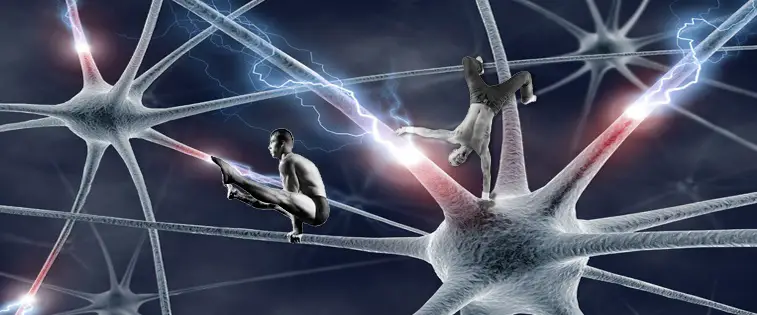By Varya Kapran
Guest Writer for Wake Up World
Today I am going to provide you with the basis for a practical understanding of the relationship between functional neurology and movement. In other words: how your brain gathers information, and how that affects movement, physical performance, weight loss, and pain-management.
Your Internal GPS
Let’s imagine you’re on a road trip. You’re excited – you’ve got plenty of beef jerky, coconut water, and your vibrams are packed. You enter your destination in your GPS, and off you go.
Having used a GPS before, you know a few things right off the bat:
[pro_ad_display_adzone id=”110028″]
(1) the GPS uses information from several satellites to guide you and create a virtual map, and
(2) it is wrong sometimes/often, and this really sucks, especially when you end up in a field instead of your hotel.
In this analogy:
— the GPS computer is your brain (in particular your cerebellum which is responsible for integrating information)
— the three satellites that gather information are the visual (eyes), vestibular (inner ear) and proprioceptive systems (the sum of your joint/muscle/other receptors)
— the map you see on the screen is the virtual map of you and your environment that your brain creates from the integration of available sensory information, past experience, and other factors
— the commands voiced in a lovely Australian accent are the motor commands that your brain sends to create movement with your body.
So let’s say that you’re driving, and the information from the satellites is accurate, the GPS computer is working fine, then the map is accurate, and the commands instruct you to turn in the right places. You’re enjoying your trip, you’re not tense, you’re driving confidently, and you arrive safely. This is the case if the whole system is functioning optimally – you have full range of motion, no injury or pain, your balance is good, your posture is tall, you are confident in your movements.
But what if one of the following issues occurs?
- one or more of the satellites are not sending sufficient information
- one or more of the satellites are sending incorrect information
- the GPS is having a computer glitch and is not integrating the information from the satellites properly
- the commands and map are inaccurate as a result of any one or combo of the above issues
How do you think you would drive in that case? Most likely, you would drive more slowly, be more cautious, maybe even tense your face and hunch a little as you desperately look for the right turn, and as a result of all these factors, you would unfortunately have a much higher risk of getting into an accident.
Now… Let’s translate those symptoms to the body.
If your information/integration/map is inaccurate, your brain, whose main priority is always your survival, will take steps to protect you from injury (or worse) by being more cautious. This manifests itself in decreased range of motion, a more rounded posture and widened stance that brings you closer to the ground (to decrease risk of falling), muscular tension, inefficient breathing (all of these are symptoms of stress), and even pain (due to map inaccuracy).
Does any of that sound familiar?
GPS Malfunctions = Sensory Mismatch = Startle
The above symptoms I described are the result of sensory mismatch, which is a huge barrier to your goals, no matter what they are. This means that you are getting conflicting or inaccurate messages for movement in the body for a variety of reasons.
Startle is a protective state of low level chronic physiological stress that your brain initiates as a response. It is usually characterized by flexion (rounding), tension (facial etc), hypo or hyper-ventilation, adduction (bringing the extremities closer to the centre), and narrowing of peripheral vision. When this continues over a long period of time, it also leads to sensorimotor amnesia (SMA) – where the proprioceptive systems (your joint/muscle/other receptors) become desensitized or habitualized. If you have ever had issues “feeling” your glutes (for example) no matter what you try, you know exactly what this means. This is an extreme example of startle.
Why should you care?
As you can imagine, this kind of state will affect your movement or physical activity. If you don’t have proper posture, have significantly decreased range of motion, cannot balance, and/or go into a startle response every time you look up, you will be unable to efficiently achieve the movements you want to perform well. Alternatively, you will be able to perform them but with a very high risk of injury. You could also start experiencing chronic or acute pains or severe physiological reactions (ie. migraines) that cannot seem to be resolved in a lasting way through any physical therapy, chiropractic treatment or acupuncture etc.
What about pain? Athletic performance? Weight loss?
Pain:
Current research has shed more light on pain (your body’s action signal), and the result is that we now know that pain does not necessarily equal tissue injury or damage. In fact, you can have (1) pain and tissue damage, (2) pain and no tissue damage, as well as (3) no pain and tissue damage. The determining factor of whether you get pain or not is whether your brain assesses the situation to be threatening to your survival or not.
To create this assessment, the virtual map we discussed earlier comes into play. If it is “blurry” or inaccurate in any way, the resulting threat/pain signal can appear in an area where there is no injury or threat, and visa versa – you may not experience pain in an area that is actually damaged and needs to be healed. If you can resolve this sensory mismatch, and decrease threat levels, you can resolve the signal and be pain free. Now that’s hope!
Athletic performance:
If you have aberrant visual reflexes for example, or decreased range of motion, or sequencing issues, your reaction time and power will all be negatively affected. By addressing these, you can become faster, generate more power, improve recovery time, and again decrease the risk of pain and injury.
Weight loss:
Startle, as we discussed already, is best termed as a chronic physiological stress response. And stress and weight loss are, well, mutually exclusive really. You may lose a bit, but will notice you “plateau” or can’t lose that last 5-10 lbs etc. While nutrition is definitely key for weight management and affects physiological stress, consider that perhaps your sensory health is actually preventing you from fitting into the dress size you are yearning for. By decreasing threat, we decrease stress (decrease cortisol), and thus improve your endocrine and metabolic health.
Ok, fine, what do I do now?
Well, you need to resolve the sensory mismatch and decrease startle. To do that you need to assess your visual, vestibular, and other reflexes, nerve function, as well as many other factors. You body and brain is complex. Luckily, there are cutting edge organizations such as Z-Health, that train practitioners in such assessments. You can find a practitioner in your area here. Or alternatively, you can learn this information yourself. This is a great place to start.
That’s all folks! I hope that helped. If you have any questions, or topics you would like to see covered, please comment below, or contact me via www.varya.ca or Facebook/VaryaWellness.
Love,
Varya
Note: If you are looking for references to support my statements, please refer to the Z-Health Reference Library here.
Previous articles by Varya:
- The Cycle of Change
- Your Body is Not a Tool
- I Am. You Are. Perfectly Imperfect.
- (re)Discover Your Inner Sexy!
- Loving Your Skin – 10 Essential Natural Topical Treatments
- Healing From Loss
- Home-Made Salted Caramel Recipe (+ Chocolate Option!)
- It’s Time To Come Home
- Is Your Diet Healthy for You? A Guide to Optimal Health
- 15-Minute Flourless Double-Chocolate Cookies Recipe (YUMMM!)
- Manifest[-ing] Love
About the author:
 Varya Kapran is a wellness coach whose mission is to help people reconnect with their bodies through holistic nutrition, herbalism, movement, and neural re-education. She works with clients worldwide supporting them in their goals through a combination of cutting edge research, alternative therapies, and other techniques. Her website, Varya.ca provides resources, care, coaching, and community for those who wish to improve their quality of life.
Varya Kapran is a wellness coach whose mission is to help people reconnect with their bodies through holistic nutrition, herbalism, movement, and neural re-education. She works with clients worldwide supporting them in their goals through a combination of cutting edge research, alternative therapies, and other techniques. Her website, Varya.ca provides resources, care, coaching, and community for those who wish to improve their quality of life.
Connect with Varya on Facebook and Twitter, or visit Varya.ca
[pro_ad_display_adzone id=”110027″]







